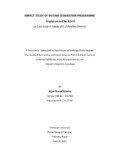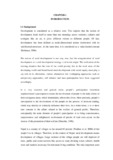Please use this identifier to cite or link to this item:
https://elibrary.tucl.edu.np/handle/123456789/573| Title: | Impact Study of Income Generation Programme Implemented by JIDCO (A Case Study of Pakala VDC of Pyuthan District) |
| Authors: | Koirala, Arjun Prasad |
| Keywords: | Sociology;Study;Income |
| Issue Date: | 2011 |
| Publisher: | Department of Sociology/Anthropology Prithvi Narayan Campus, Pokhara |
| Institute Name: | Prithivi Narayan Campus, Pokhara |
| Level: | Masters |
| Abstract: | This study deals with the Income Generation Programme (IGP), one of the programs run by Jhimruk Industrial Development Centre (JIDCO) with an aim to improve the livelihood and economic status of people living in 9 VDCs that are affected by the construction of Jhimruk Hydro Power. The general objective of this study was to identify the level and perception of local people and their participation in the programmes and trainings run by JIDCO. The specific objectives of the study were to assess the perception and participation of people in the Income Generation Program (IGP) implemented by JIDCO, to assess the socio-economic impact of it and to examine strength and weakness of it. JIDCO has been implementing its IGP programmes in all 9 VDCs including Pakala, which are directly affected by the construction of Jhimruk Hydro Power project. The researcher selected Pakala VDC from among 8 other VDCs as it was more convenient for him to conduct this study from the give time constraint and budget. The study is basically based on empirical data along with available pertinent secondary data. For data generation multi-methodological approach was applied. For primary data generation, household survey of both non-participant and participant respondents, key-informant interview, focus-group discussion and observation methods were applied. Besides these field diary was also maintained to be more reliable information. The sample size was 50(25 participant respondents and 25 non-participant respondents) in total. The researcher had collected the name-list of the participants and select respondents from among them. The sampling size was 50% (25 respondents) of the people who had participated in IGPs. From the participant respondents, 12 % quota was reserved for the artisan and 20% each for women and ethnic group as JIDCO had informed that they were comparatively excluded and economically poor than Chhetry and Brahmin in the VDC. Likewise, to get better understanding about the impact of income generation programme, 25 non-participant respondents were selected. Caring the report of JIDCO about less participation from artisan and women from the VDC, the researcher had allocated 40% quota (20% each) for artisans and women and the rest 60% for economically poor, indigenous, ethnic and other caste groups. To find out non-participant respondent who was economically poor in the village the researcher had taken the help of key-informants. For the selection of the households, the simple random sampling method was used. The study is descriptive and analytical in nature in which descriptive statistic is applied for the analysis of the data. The analysis of the data was done manually. From the study it was found that all the respondents had positive remarks about JIDCO though it has to go for some correction in its some aspects. If was discovered that the family type, landholding size and educational level of the people were more influencing socio-economic factors that had determined poor and inactive participation in the study area. In general, income generating trainings provided to the local people by JIDCO’s were successful to increase their income to some extent. The trainees are acutely facing capital and market problem so that they fear to start their own enterprise. Nearly half portion (52%) of participant respondents had run their own enterprises. Those respondents who have not started their own enterprise stated that lack of money, availability of pesticides, lack of time, market and confidence are their problems. The local people of the study area have positive attitude towards IGPs, but their major comment was that their training period was very short. And it was found that there wasn’t proper dissemination about JIDCO and its programs that are highly appreciative in themselves. There is no effective initiation in field of raising awareness and the result is that the minority privileged group is benefited more that the poor. Majority of trainees who had taken enterprise development trainings are successful to improve their socio-economic status. The entrepreneurship development scenario is also satisfactory and 48 percent trainees have accepted that the trainings they had taken were much helpful for them and they have increased their income than earlier. The improved earning has enabled them for better schooling to their offspring, better clothes and, more comfortable life. Based on the findings of this study, the following recommendations are suggested for the improvement and better functioning of the Income Generation Programs: • JIDCO is recommended to initiate for right based (political, economic, social, property, educational, development process, women so on) and demand based approach. • So far, capital is the major barrier of the trainees to run their own enterprises in the study area JIDCO has to either arrange credit facility for the potential entrepreneurship or should coordinate and liaise with other organizations for it. • The emic1 approach that is dominant in almost all programs have to be discouraged and go for application of etic2 approach. • Since the level of awareness, education, economy, gender, caste/ethnicity, age, geographical distance, etc. are the sensitive elements in the field of development these should be cared most. Similarly, the gap between the training and the need of people should be reduced. The elements widening the gap between two must be identified and effective curriculum should be developed with participatory approach. • Should run trainings and programs in the off-farming period. • Conduct regular talk programs with the local people along with the teachers, and other rural elites for creating awareness. • Use media for information flow, awareness building and activate the participants showing documentary films on the related subjects. Besides, JIDCO should give continuity to reward the best participant for best performance. Take them to the field trip as their reward. And for the field trip select the concerning exemplary site. • Enroll local volunteers and mobilize them in the working sites for better result with less expense. For volunteers, JIDCO can select students or unemployed youngsters adding a new chapter in its working area in the field of development. In the case of student volunteers, it can mobilize them in the off-school days. This procedure is not only cost effective but also more result oriented. Further, it creates job opportunity to the local people and career development opportunity to the youngsters. |
| URI: | http://elibrary.tucl.edu.np/handle/123456789/573 |
| Appears in Collections: | Sociology |
Files in This Item:
| File | Description | Size | Format | |
|---|---|---|---|---|
| Cover Page(6).pdf | 78.93 kB | Adobe PDF |  View/Open | |
| CHAPTER(1).pdf | 472.24 kB | Adobe PDF |  View/Open |
Items in DSpace are protected by copyright, with all rights reserved, unless otherwise indicated.
